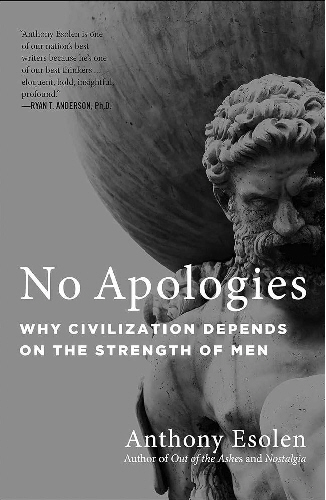No Apologies: Why Civilization Depends On The Strength Of Men -- By: Greg Morse
Journal: Eikon
Volume: EIKON 05:2 (Fall 2023)
Article: No Apologies: Why Civilization Depends On The Strength Of Men
Author: Greg Morse
Eikon 5.2 (Fall 2023) p. 102
No Apologies: Why Civilization Depends On The Strength Of Men
Greg Morse is a staff writer for desiringGod.org and graduate of Bethlehem College & Seminary. He and his wife, Abigail, live in St. Paul with their son and two daughters.

Anthony Esolen. No Apologies: Why Civilization Depends on the Strength of Men. Washington, D.C.: Regnery Gateway, 2022.
As a university student, I remember stumbling upon an article in The Atlantic, “The End of Men.” Women now surpassed men in the workforce — to the betterment of society? Were women better adapted to a post-industrial workplace than men? Had we finally arrived at the end of men — ruling, leading, providing? That was over a decade ago.
Into a world further adrift in confusion, Anthony Esolen has written a book he himself wished need not be written. But write it, he did. And read it, we should. The title contains the tone — No Apologies — the subtitle, a thesis — Why Civilization Depends on the Strength of Men. Esolen attempts to convince us of what was once obvious: that this world does not run by
Eikon 5.2 (Fall 2023) p. 103
magic but is built and sustained by the might of men living happily as men.
What if we have come to the end of men? “It would mean our end, our death; imagine a great city, rotting at the core, with no one strong enough to shore up the ruins” (2). Six chapters chisel and sculpt man as civilization has needed him — then and now. And this against that ideology whose desire is contrary to the man: Feminism and all her sickly offspring.
Man as He Was Fashioned
What kind of man does Esolen place before us?
First, Esolen chisels the muscles of this gritty warrior. He displays the forte, the force, the brawn of the taller, faster, thicker, action-craving man. God created the world, man builds it, which we can easily forget in a post-industrial, technically-advanced world. “Every road you see was laid by men. Every house, church, every school, every factory, every public building was raised by the hands of men. You eat with a stainless-steel fork; the iron was mined and the carbon was quarried by men. . . . The whole of your civilization rests upon the shoulders of men who have done work that most people will not do — and that the physically weaker sex could not have done” (x).
Feminism then, to Esolen, is an ungrateful fantasy, attempting to expel man from the city he built. She scribes her scathing treaties within a well-heated, warmly-lit world built (and sustained) by men. The oil in her pen, th...
Click here to subscribe
